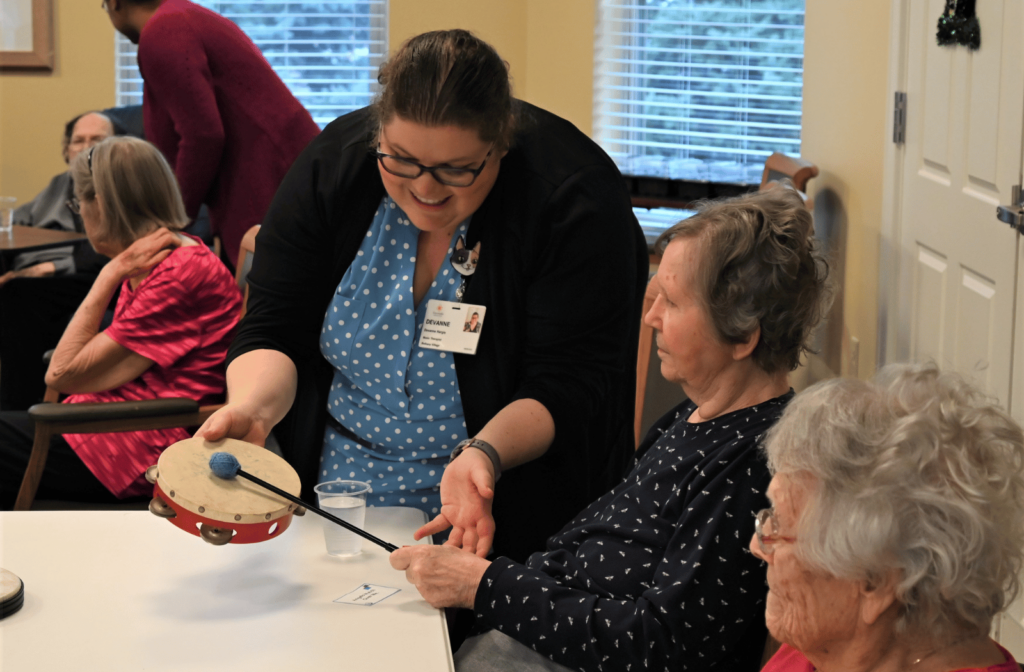In our later years, when life moves at a slower pace, a familiar tune can stir memories and bring comfort. Embracing an active lifestyle as we age involves practices that nourish both body and mind.
For seniors navigating the complexities of aging, finding avenues for active engagement and holistic well-being is key. Music therapy has become a valuable resource for seniors, promoting movement, community, and therapeutic benefits like improvement of cognitive function.
What Is Music Therapy?
There are theories in human history that we sang before we spoke. Music therapy is an evidence-based established health profession that taps into the holistic healing properties of music to improve overall well-being and quality of life across different areas such as:
- Cognitive
- Emotional
- Physical
- Social
Board-Certified Music Therapists (MT-BCs) use a wide range of techniques, such as playing instruments, singing, songwriting, improvising, and listening to music, to facilitate interactive experiences tailored to you or your loved one’s preferences and needs.
These sessions aim to promote meaningful responses fostering a sense of connection and expression.
What Ages Benefit from Music Therapy?
Music’s impact extends across all stages of life, from infancy to old age. It begins with lullabies soothing infants to sleep and continues through adolescence, where music becomes a source of solace and self-expression.
As we age, the benefits of music therapy become increasingly apparent. It serves as a valuable tool for memory care and motor skills rehabilitation in seniors.
Benefits of Music Therapy For Seniors
- Enhancing Memory & Cognitive Function
Music therapy is more than just entertainment for seniors; it may help unlock their memories and enhance cognitive abilities. Melodies and rhythms function as potent mnemonic devices, helping trigger the recollection of past events and experiences. Research evidence has shown that music activates both hemispheres of the brain.
By engaging in music therapy sessions, seniors can potentially maintain and improve their cognitive abilities, resulting in a more enriched and fulfilling quality of life as they navigate their golden years.
- Elevating Mood & Emotional Well-being
By stirring emotions and memories, music can bring comfort, happiness, and peace, significantly boosting mood. Through its therapeutic use, music helps reduce symptoms of depression and anxiety, provides opportunities for emotional and self-expression, and addresses coping skills, enhancing emotional well-being in later life.
- Fostering a Sense of Community
In long-term care settings, where seniors may feel isolated or disconnected, music therapy serves as a bridge, fostering a sense of connection and belonging within group settings as well as within the therapeutic relationship with the music therapist.
Through shared musical experiences, seniors can bond, reminisce, express themselves, and find joy in each other’s company, enhancing their quality of life.
- Promoting Movement & Physical Health
Music therapy not only uplifts the spirit but also promotes physical activity. It encourages movement, whether through dancing, playing instruments, or rhythmic tapping, which contributes to maintaining and enhancing:
- Motor skills
- Coordination
- Physical health
The rhythmic nature of music serves as a gentle prompt for physical expression, motivating you or your loved ones to stay active and attentive to their physical health. Music therapy is also a non-pharmacological approach to reduce and manage pain as well as improve sleep.
Getting Started With Music Therapy
If you’re interested in exploring music therapy for yourself or a loved one, there are several avenues you can look into:
- Check local senior living communities: Music therapy programs are offered at select senior living communities, including Bethany Village.
- Find a Board-Certified Music Therapist (MT-BC): Look for a board-certified music therapist in your area who has completed a recognized music therapy program and holds the credentials MT-BC. They can provide professional guidance and support.
- Consider group or individual sessions: Music therapy can be done in group settings or one-on-one sessions depending on preferences and needs. Consult with a board-certified music therapist to determine what suits you or your loved one best.
- Select appropriate music: The type of music used in therapy is based mainly on personal preference but can vary based on individual or group goals. At home, you and your loved one can utilize calming and uplifting music for relaxation and mood improvement, or choose more upbeat tunes for physical activities.
- Keep an open mind: When trying music therapy, stay open to different approaches and types of music. Ask questions! Music therapy assessments and experimentation may be necessary to find what resonates best with you or your loved one to work toward desired goals.
Music Therapy at Bethany Village
Music therapy holds great potential for improving your loved one’s quality of life as they age. It can effectively reduce stress and anxiety while also enhancing memory and cognitive function, which is particularly beneficial for those with memory care needs.
Bethany Village prioritizes creating a supportive environment to gently stimulate long-term memory.
Our community serves as a valuable learning space for music therapy students from various parts of the country, offering both short-term clinicals and long-term internships.
Our approach focuses on forging connections between significant long-term memories and the present moment, aiming to positively impact the lives of residents.
If you’re interested in learning more about our music therapy program at Bethany Village, please contact us or our music therapist, Devanne Hargis, MT-BC, at dhargis@graceworks.org. We’d be delighted to provide you with further information.

